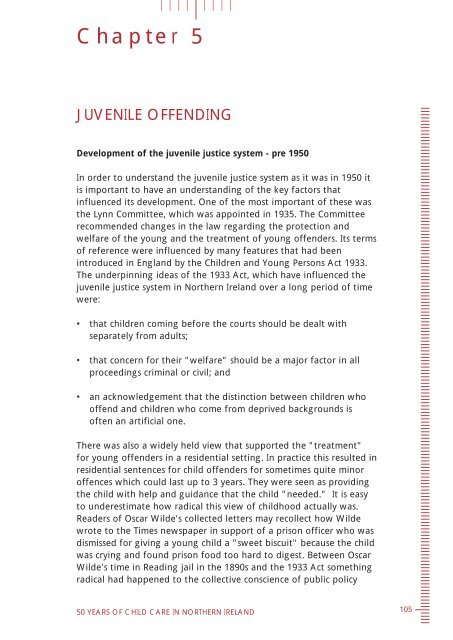childcare-50years
childcare-50years
childcare-50years
You also want an ePaper? Increase the reach of your titles
YUMPU automatically turns print PDFs into web optimized ePapers that Google loves.
Chapter<br />
5<br />
JUVENILE OFFENDING<br />
Development of the juvenile justice system - pre 1950<br />
In order to understand the juvenile justice system as it was in 1950 it<br />
is important to have an understanding of the key factors that<br />
influenced its development. One of the most important of these was<br />
the Lynn Committee, which was appointed in 1935. The Committee<br />
recommended changes in the law regarding the protection and<br />
welfare of the young and the treatment of young offenders. Its terms<br />
of reference were influenced by many features that had been<br />
introduced in England by the Children and Young Persons Act 1933.<br />
The underpinning ideas of the 1933 Act, which have influenced the<br />
juvenile justice system in Northern Ireland over a long period of time<br />
were:<br />
• that children coming before the courts should be dealt with<br />
separately from adults;<br />
• that concern for their "welfare" should be a major factor in all<br />
proceedings criminal or civil; and<br />
• an acknowledgement that the distinction between children who<br />
offend and children who come from deprived backgrounds is<br />
often an artificial one.<br />
There was also a widely held view that supported the "treatment"<br />
for young offenders in a residential setting. In practice this resulted in<br />
residential sentences for child offenders for sometimes quite minor<br />
offences which could last up to 3 years. They were seen as providing<br />
the child with help and guidance that the child "needed." It is easy<br />
to underestimate how radical this view of childhood actually was.<br />
Readers of Oscar Wilde's collected letters may recollect how Wilde<br />
wrote to the Times newspaper in support of a prison officer who was<br />
dismissed for giving a young child a "sweet biscuit" because the child<br />
was crying and found prison food too hard to digest. Between Oscar<br />
Wilde's time in Reading jail in the 1890s and the 1933 Act something<br />
radical had happened to the collective conscience of public policy<br />
50 YEARS OF CHILD CARE IN NORTHERN IRELAND<br />
105


